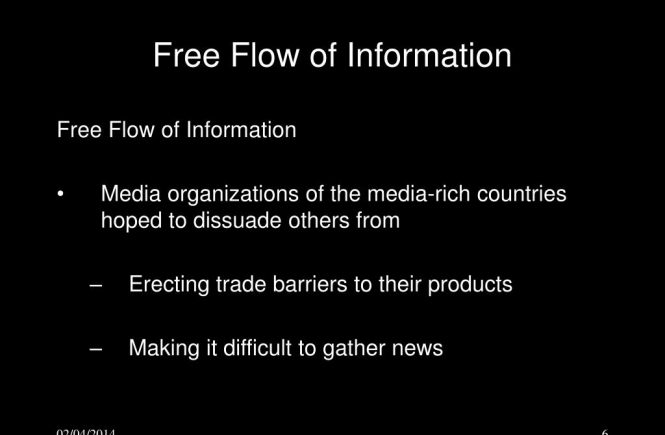Free flow of information, After the Second World War and the establishment of a bi-polar world of free market capitalism and state socialism, theories of international communication became part of the new Cold War discourse. For the supporters of capitalism, the primary function of international communication was to promote democracy, freedom of expression and markets, while the Marxists argued for greater state regulation on communication and media outlets.
The concept of the ‘free flow of information’ reflected Western, and specifically US, antipathy to state regulation and censorship of the media and its use for propaganda by its communist opponents. The ‘free flow’ doctrine was essentially a part of the liberal, free market discourse that championed the rights of media proprietors to sell wherever and whatever they wished. As most of the world’s media resources and media-related capital, then as now, were concentrated in the West, it was the media proprietors in Western countries, their governments and national business communities that had most to gain.
The concept of ‘free flow’ therefore served both economic and political purposes. Media organizations of the media-rich countries could hope to dissuade others from erecting trade barriers to their products or from making it difficult to gather news or make programmes on their territories. Their argument drew on premises of democracy, freedom of expression, the media’s role as ‘public watchdog’ and their assumed global relevance. For their compatriot businessmen, ‘free flow’ assisted them in advertising and marketing their goods and services in foreign markets, through media vehicles whose information and entertainment products championed the Western way of life and its values of capitalism and individualism.
For Western governments, ‘free flow’ helped to ensure the continuing and unreciprocated influence of Western media on global markets, strengthening the West in its ideological battle with the Soviet Union. The doctrine also contributed to providing, in generally subtle rather than direct ways, vehicles for communication of US government points of view to international audience (UNESCO, 1982; Mosco, 1996; Mowlana, 1997).
